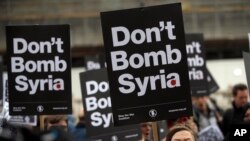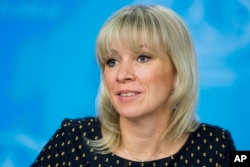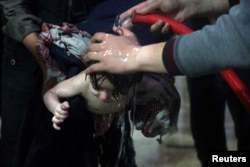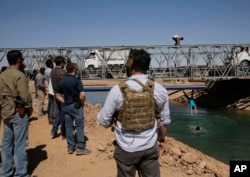The past week has sounded to some like a repeat of the Cuban Missile Crisis when America and Russia, two nuclear-armed powers, headed toward a catastrophic clash amid skyrocketing tension.
Back in 1962, it was the Russians who blinked, with Soviet leader Nikita Khrushchev deciding not to tempt fate — or the resolve of John F. Kennedy. He ordered Cuba-bound ships laden with missiles for Fidel Castro to back off from a U.S. blockade of the Caribbean island.
For most of this week, the leaders of the U.S. and Russia, as well as their officials, traded dire warnings in rhetorical exchanges as fierce as any witnessed during the Cold War.
U.S. President Donald Trump started the week warning that "missiles will be coming to Syria" to punish Syrian President Bashar al-Assad for the latest alleged chemical weapons attack blamed on Syrian government forces.
Russian envoys, including the ambassador to Lebanon, countered that Russian forces would shoot down any U.S. missiles fired at Syria and target ships and planes that launched them. Those warnings were characterized Thursday by a retired top British general as a virtual declaration of war and raised the prospect of the first naval clash between any powers in a generation.
But by Thursday, both sides appeared anxious to dial down the rhetoric, and it was the Russians who took the biggest step back, redefining what would prompt them to respond militarily to any U.S.-led punitive raids on Syria.
In an interview with Britain's Sky News, Maria Zakharova, spokeswoman for the Russian Foreign Ministry, shifted Russia's "red line," focusing her remarks on the risks that would be encountered if Russian personnel on the ground in the war-wracked country were killed.
Asked directly about the threat to shoot down incoming missiles, and attack the bases and ships firing them, she hesitated, saying, "Russia should protect its people on the ground, of course." She added she didn't want to think about the possibility of Russian or American blood being spilled, arguing that Washington and Moscow could resolve their differences over Syria with better communications.
By removing the threat of Russian retaliation for a missile strike on Syria, the likelihood has increased that Russian President Vladimir Putin will do what he did last year when the U.S. punished Assad for using chemical weapons on his own people - namely, nothing, say analysts.
Hours later Thursday, U.S. Defense Secretary Jim Mattis also sounded a note of restraint, telling lawmakers a missile strike was just one of the options being considered by the Trump administration to deter Assad from repeating last Saturday's alleged chemical weapons attack on the town of Douma on the outskirts of Damascus, in which 70 people died and hundreds were injured.
Syria has denied using chemical weapons and the Russians claim the attack was fake or staged by a shifting cast of characters, including foreign intelligence services and the White Helmets, volunteer first responders working in Syria's rebel-held areas.
Officials and analysts say a U.S.-led punitive strike on Syria is still all but certain. From Mattis to Britain's Prime Minister Theresa May and France's President Emmanuel Macron, the consensus among Western leaders is that Assad's use of chemical weapons shouldn't go unanswered and that it must be large enough to change the Syrian leader's calculus about the use of chemical weapons.
"We have to re-establish the taboo against using chemical weapons. The taboo has got frayed. It is important that there's a reaction," said John Sawers, a former British intelligence chief.
But neither Washington nor Moscow wants to see an escalation of the overall long-running conflict in Syria, say analysts. President Donald Trump has already indicated he would like to withdraw the approximately 2,000 U.S. ground troops currently in northern Syria, where they've been assisting Syrian Kurds to defeat Islamic State militants.
"We'll be coming out of Syria very soon. Let the other people take care of it now," the U.S. leader said earlier this month.
Syria gains at stake
On a cost-benefit analysis, the Kremlin has more to lose from any escalation or prolonging of the seven-year-old, multi-sided Syria conflict, now that their longtime ally Assad, thanks to Russian and Iranian military assistance, has swung the battlefield decidedly in his favor and all but won.
Any major escalation risks reversing the military dynamic.
"It is not obvious how the Russians can extricate themselves from a binary decision," said Jonathan Eyal of the Royal United Services Institute, a London-based research group. "Either they confront the American-led operation which is about to come to Syria, or they don't do anything," he added.
The latter course would make Russian President Putin appear weak and until now he's been successful in avoiding having to choose to back down or escalate when confronting the West, Eyal said, "Set aside the bluster that comes from Moscow and they are far, far less secure about how this will play out in the next few days."
The scale of the U.S.-led retaliation on Assad may well determine how Russia responds. U.S.-led strikes impacting the front lines, and certainly any loss of Russian lives, could strip the Kremlin of the opportunity of restricting its response to one of just issuing angry protests, as it did last year when the U.S. launched 59 Tomahawk Cruise missiles on a Syrian airbase after a purported Assad chemical weapons attack on Khan Shaykhun in northern Syria.
To assist the Russians, the U.S. tipped off Moscow about what would be targeted, allowing the Kremlin to move its servicemen out of harm's way. That would likely happen again, said U.S. officials.
But there are also pressures on Washington not to go as lightly as last year on any retaliation for the Douma attack. In the past, mild punishments have not deterred Assad. "It is clear that any retaliation for the latest use of chemical weapons, possibly the 25th use we have seen recently in Syria, must be bigger than the last retaliation," according to Peter Roberts, another analyst at the Royal United Services Institute.
But bigger retaliation raises the risks of Russian personnel being killed.
The Gulf states - Qatar, Saudi Arabia and the United Arab Emirates - have been lobbying for much tougher action this time round, said U.S. officials. They have offered to participate, determined that any strikes are sizable enough to weaken the military presence in Syria of their arch-foe Iran, another Assad backer.
Israel, too, is determined to stop Iran from establishing bases in Syria, and, on April 9, it launched a Cruise-missile strike on an airbase in central Syria near the ancient city of Palmyra. The strike targeted Iranian Revolutionary Guardsmen, one of dozens of cross-border strikes the Israelis have carried out in Syria since the start of the Syrian war in 2011, mostly focused on either Iranian forces or Hezbollah, the Tehran-tied Lebanese Shi'ite militia.
There are already signs that Israeli Prime Minister Benjamin Netanyahu, who meets and talks frequently with Putin and is close to Trump, is emerging as a key figure behind the scenes as Washington and Moscow and their allies maneuver to seek a way for U.S.-led retaliation on Assad to proceed without escalating the conflict or expanding it. On Wednesday, Putin and Netanyahu talked and, according to Israeli officials, discussed both Iran's presence in Syria and the Assad chemical weapons attack.








